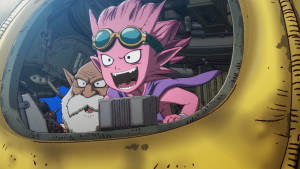Please support Game Informer. Print magazine subscriptions are less than $2 per issue
The Legend Of Zelda’s Weird (And Sometimes Bad) Offshoots

The Legend of Zelda is one of video games’ darlings. It has set many gameplay standards and created numerous innovations for video games over the course of its tenure, and is cited by many as being their favorite franchise. The series isn’t perfect, however, and a few disappointing or just plain bad offshoots with the Zelda name on them have made it into the wild. Thankfully, even the duds do little to tarnish the Zelda legacy, but that doesn’t mean we can’t talk about them.
Link: The Faces of Evil, Zelda: The Wand of Gamelon, And Zelda's Adventure
Perhaps the most infamous (or legendary if you prefer) of Zelda’s missteps – three Zelda games released on Phillips’ ill-fated CD-i console. Nintendo was not involved in the development of these games at any capacity and it is rumored that they exist thanks to a loophole in a contract between Phillips and Nintendo that came about while Nintendo was exploring the idea of creating a console that used discs as opposed to cartridges.
The games are universally reviled, and it only takes a few minutes of playing any of the games (which you can see in an episode of Replay above) to see why. The animation is atrocious, the games play poorly, and very little of what makes Zelda special or interesting is inserted into any of the games. Zelda’s Adventure is the least hated among the three missteps as it is a fair bit different from The Faces of Evil and The Wand of Gamelon, and actually uses the traditional overhead perspective, but it’s still a terrible game.
Link’s Crossbow Training

Link’s Crossbow Training smartly removed the name Zelda from its title, but it’s still a weird, not particularly fun entry in the library of Zelda games. Packaged with a plastic gun-like shell for the Wii Remote, the Wii Zapper, the game was built using Twilight Princess’ assets and places Link in a shooting gallery without much else to do. It doesn’t add anything to Zelda’s canon and gave Link a crossbow capable of firing at high-speeds, which just felt like an odd, uncharacteristic item for him to use.
Freshly-Picked Tingle's Rosy Rupeeland
Released only in Japan and Europe, Freshly-Picked Tingle's Rosy Rupeeland stars arguably Zelda’s strangest character. It’s a character few felt like they didn’t spend enough time with between Majora’s Mask and Wind Waker, which might explain why it never came to North America. In the game, players play as Tingle as he collects rupees and feeds them to a lake at the request of a man with a giant rupee for a head. Rupee-head man promises Tingle that if he offers enough rupees, he will be able to make his way to Rupeeland. It’s weird, silly, and ultimately doesn’t have much to do with The Legend. You can see us play the game in the video above starting at the 27:34 mark.
The Legend Of Zelda Animated TV Show

An animated show inspired by the first two Zelda games aired in 1989 as part of The Super Mario Bros. Super Show! It featured a sarcastic Link with the catchphrase, “Well, excuuuse me Princess!” and a self-sufficient Zelda who rarely needed help from the hero with a green tunic. It did nothing remarkable compared to most animated cartoons of the late ‘80s, and had little to do with the game that inspired it, outside of names of the characters and the medieval fantasy setting. It did give Link his first chatty fairy partner, though, which we wouldn't see again until the release of Ocarina of Time.
The Legend Of Zelda Comic Books And Manga

There have been a number of Zelda comic book and manga series, some based on specific games, and some taking place outside of the main Zelda game series. The very first series was published in 1990, and shares some character designs with the animated TV show, most obviously with the design of Princess Zelda. Some strange details from the first comics that do not appear in the games include Link’s horse being named Catherine, the inclusion of Zelda’s father, King Harkinian, and a character named Captain Krin – a character who has not appeared in any Zelda video games. The comics have rarely seen mainstream acclaim, but they aren't disliked. This might be because most of them are direct re-tellings of the games they are based on as opposed to original stories.
For our review of The Legend of Zelda: Tri Force Heroes, which treads the line of offshoot and core Zelda entry, head here.










